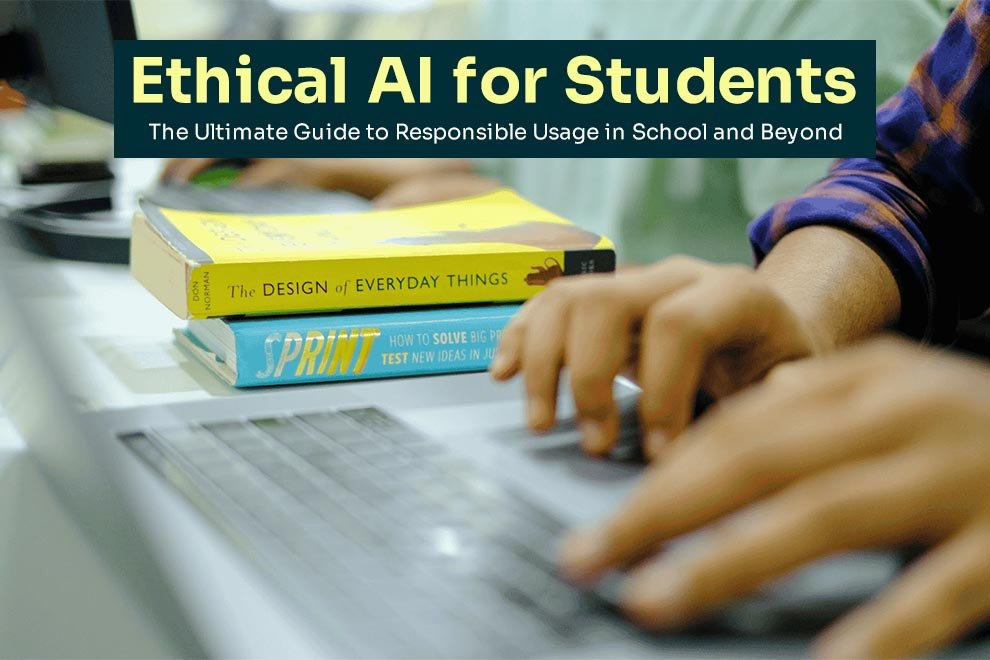With AI becoming part of classrooms, homework, and even study groups, students face both new possibilities and new challenges. While AI tools can explain difficult topics or speed up tasks, the real question is how to use them responsibly, without replacing independent thinking.
We connected with Nova Scholar to gain a perspective on research opportunities for high school students. They explained that research builds habits of curiosity and verification, which translate directly into more responsible and effective use of AI. When students learn to ask better questions, evaluate sources, and organize information, they become less likely to accept AI-generated answers at face value.
Understanding What “Ethical AI” Means in School
AI is not just for tech experts anymore. Students use it every day, sometimes without even noticing. Spell checkers, math-solving apps, and even translation tools all run on AI. Since these tools are everywhere, it is important to think about what it means to use them in an ethical way.
So what does “ethical AI use” mean?
It simply means using AI in a way that is fair, honest, and helps you learn. Here are a few examples:
- Being open with your teacher if you used AI to get help on an assignment
- Giving credit when AI or other sources shaped your work
- Using AI for ideas, practice, or feedback instead of copying answers
Some students believe AI is there to do the hard work for them, but that is not true. When you let AI replace your own effort, you lose the chance to practice skills you will need later. Schools, universities, and firms care about honesty and growth, and learning how to use AI responsibly shows you value both.
Smart Ways Students Can Use AI (Without Cheating)
- Brainstorming ideas: Ask AI for topic suggestions when starting an essay or project.
- Checking grammar and clarity: Use it to polish your writing and catch small mistakes.
- Practice quizzes: Generate practice questions to test your understanding before a big test.
- Study support: Ask for summaries of complex topics, but always double-check facts in your textbook or class notes.
In contrast, unethical usage includes:
- Using AI to develop and elaborate arguments.
- Copying an entire AI-written essay and turning it in as your own.
Building School Policies and Personal Guidelines for AI
Most schools are still figuring out how AI should fit into classrooms. Organizations offer practical policy templates and frameworks that student councils, educators, and school administrators can adapt to their own communities.
While schools work on official policies, students can take steps to stay responsible:
- Acknowledge the gap: Many schools don’t yet have clear rules for AI use.
- Set personal guidelines: Always check facts, avoid copying, and be transparent with teachers.
- Work with peers: Student councils and clubs can start conversations and suggest fair school-wide policies.
- Build trust: Clear personal and school rules strengthen the relationship between students and teachers.
- Think ahead: Since colleges already detect AI in essays, practicing honesty now prepares you for the future.
Common Pitfalls and How to Avoid Them
Many students run into the same mistakes when using AI for schoolwork. Knowing these pitfalls ahead of time will help you avoid problems and keep your learning on track.
Common mistakes students make with AI:
- Plagiarism: Copying full answers from AI and turning them in as your own.
- Over-reliance: Letting AI do all the thinking instead of practicing skills yourself.
- Misinformation: Believing everything AI says without checking if it is correct.
- Skipping the learning process: Using AI to finish assignments faster, but missing the chance to actually understand the topic.
Remember, the goal is to make AI a study tool, not a shortcut. If you are writing essays or research projects, it is important to know the limits of AI use. By staying aware of these limits, you protect your integrity and actually get more value out of the learning process.
Preparing for the Future: AI Skills Beyond the Classroom
The habits you build now will also help you in college, internships, and even future jobs. More and more workplaces expect students to know how to work with technology, and AI is part of that future.
How ethical AI habits help you later:
- College projects: Professors value original thinking. If you already know how to use AI for brainstorming and research without copying, you will be ahead.
- Internships and jobs: Many companies use AI tools for tasks like research, reports, and problem-solving. Knowing how to use them responsibly makes you more prepared.
- Critical thinking: By checking AI answers and adding your own ideas, you learn to think deeply instead of just accepting easy solutions.
- Collaboration: In group projects, using AI as a shared support tool can help everyone stay organized and creative.
If you start practicing now, you will treat AI as a partner in growth, not a hack that holds you back.
Author bio:
Chloe Avril is a contributing writer at NovaScholar.org, where she covers global education trends, student opportunities, and academic innovation.
She’s passionate about helping international students navigate admissions and scholarships worldwide.










